Speed test
Speed test
Let’s run a quick check-up
Let’s run a quick check-up
Your speed test results may not match your plan speeds—but don't worry, that's normal. Browsers have different capabilities and may give you different results, particularly on high-speed connections. If you want something to compare against, try downloading the Speedtest app for some extra accuracy.
Sign in to your account to easily compare the Speed Test results to your Internet plan.
How much will my Internet plan cost?
Your monthly bill is made up of 3 parts:

Your plan price

Your equipment (unless you bring your own)

Your local taxes
Unexpected results do not necessarily mean there's a problem with your Cox service. Many factors inside your home can cause the speeds on your device to be slower than the speeds Cox delivers to your home. Learn More ›
Want to improve your speed test results?
Want to improve your speed test results?
Here are a few steps you can take:
7 tips to improve your internet speed
7 tips to improve your internet speed
Many factors inside of your home can affect your speed. Follow these tips to enhance your speed:

Reboot equipment
Reboot equipment
Reboot your modem and devices by powering them off and back on for optimal performance.

Cut the cameras
Cut the cameras
Only use video conferencing for those must-see moments. If video conferencing is the preferred way to meet for your job, try service-saving hacks like only turning on your camera when speaking and lowering your video resolution, or using audio-only.

Keep it on the low
Keep it on the low
Do you have a doorbell camera or other security cameras around your home? Consider lowering the resolution while you're at home.

Get a 360 view
Get a 360 view
View and manage devices on your home internet from the Panoramic Wifi App. You can turn the kids' iPads off when they've reached screen time limits or pause their wifi when you're on an important call.

Mind your network health
Mind your network health
Computer viruses and malware can slow down your home internet. Use Cox Security Suite Plus powered by McAfee to protect your home computer. Panoramic Wifi customers can also turn on Advanced Security in the Panoramic Wifi App.

Network safety first
Network safety first
Double check that your home internet network is password-protected and no one else but your family is using it. Learn more

Microwaves matter
Microwaves matter
Did you know your internet experience could be slowed down if your wifi router is near a microwave, a fish tank, or mirror?
Tips for improving wifi speeds
Tips for improving wifi speeds
Tips for improving wifi speeds
There are steps you can take to improve your wifi experience, but keep in mind that Wired (Ethernet) connections are faster and will provide more accurate speed test results.

Disconnect other devices
Disconnect other devices
Disconnect other devices and close all other programs, applications, and browser tabs (except the tab with the Speed Test) on your device to eliminate network congestion
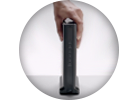
Move your router
Move your router
Place your router in a central, elevated, open location away from walls, metal objects, and objects that transmit radio waves like cordless phones, microwaves, & Bluetooth devices

Stand in different places
Stand in different places
Test your speed in different places around your home. Distance from the router and interfering objects can affect speeds.
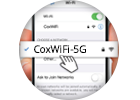
Connect to 5GHz network
Connect to 5GHz network
If you have a dual-band router, connect to the 5GHz network unless you are far away from the router or your device isn’t compatible
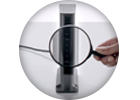
Check your router
Check your router
Make sure your router operates on the 802.11ac standard.
Time to upgrade?
Explore Panoramic Wifi ›
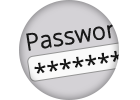
Password protect
Password protect
Protect your network with a strong password to prevent others from using your wifi. Use a combination of upper and lower case letters, numbers and special characters.
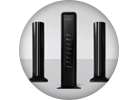
Add wifi extenders
Add wifi extenders
Wifi extenders can stretch your network to eliminate dead zones. Extenders are available with Panoramic Wifi from Cox.
For more help improving your wifi, check out the ways to Improve your In-home wifi network article in Cox Support.
Speed Test FAQs
Speed Test FAQs
Do I have to sign in to run the test or connect to a Cox network?
Do I have to sign in to run the test or connect to a Cox network?
No – you are not required to sign in prior to starting the Speed Test; however, by signing in first, you can see your current Cox Internet plan speeds to easily compare them to your speed test results. The test is intended to be run on your in-home Cox network but can be run on another network, such as using your mobile carrier data or public wifi.
Can I test my Cox Internet speed using my smartphone, tablet or other mobile device?
Can I test my Cox Internet speed using my smartphone, tablet or other mobile device?
Absolutely! We have designed the speed test so that it scales to multiple device types (Desktop Computer, Laptop, Tablet and Phone) and most major operating systems. Please note that laptop and desktop computers connected directly to your Cox modem typically provide better results than mobile devices due to the factors listed above.
Does Cox guarantee my Internet speed test results will be the same as my subscription tier?
Does Cox guarantee my Internet speed test results will be the same as my subscription tier?
No. Cox does not guarantee that the results of the speed test will match your plan subscription 100% of the time. This is due to a number of factors beyond Cox’s control which may impact your speed, including (but not limited to) the processing power of your personal computing equipment, applications running on your computer, the nature and quality of your home network connection, third party networks you may be connected to, and the performance of the websites you visit and congestion on the Internet.
How does the Cox Internet Speed Test tool work?
How does the Cox Internet Speed Test tool work?
The Cox Internet Speed Test is backed by Ookla and measures the ping (latency), download speed and upload speed between your device and a test server. Note that it does not measure the speed Cox is delivering to your modem since many factors affect the speed in your home as it's processed by your modem, device, and everything in between.
During the test, multiple connections to a nearby test server are made to measure latency and download/upload speeds. All samples are sorted by speed, and the two fastest results and the bottom quarter of the remaining samples are removed. The remaining samples are then averaged.
Why are my Cox Internet Speed Test results different than results from other online speed tests?
Why are my Cox Internet Speed Test results different than results from other online speed tests?
Test methodologies differ between speed test websites, which can cause your results to be different even if the conditions under which you're performing the test are the same. Here are some factors that can differ:
1. The location of the server being tested
2. The number of threads being used
3. How results are measured from analyzing test samples
So what do all of the terms, like "latency," mean? (Glossary)
So what do all of the terms, like "latency," mean? (Glossary)
Wired Connection – using an ethernet cable connected from your device directly to the modem to connect to the Internet and other devices
Wifi Connection – a wireless network that uses a radio frequency signal to connect your devices to the Internet and to each other
Cellular Connection – a network distributed by mobile carriers (AT&T, Verizon, Sprint, T-Mobile, etc.) over land through cells that together provide radio coverage over larger geographical areas
Download – how fast your connection delivers content from the Internet to your device. It determines how long it takes to download files (like photos, movies, songs) or display webpages with lots of images.
Upload – how fast content is delivered from your device to the Internet. It determines how long it takes to post pictures to social media or upload an email attachement.
Mbps – Megabits per second (Mbps) is is the industry-standard measure of transfer rate or Internet speed.
Latency – The reaction time (measured in milliseconds) of your connection–how quickly your device gets a response after you’ve sent out a request
Test Server – a computer system used as the central repository of data and various programs that are shared by users in a network
IP Address – a unique string of numbers separated by periods that identifies each computer using the Internet Protocol to communicate over a network
Modem – a small device that connects to your Internet Service Provider (ISP) to provide Internet in your home
Router – a small device that connects to your modem via an Ethernet cable and passes the Internet connection on to other devices either via additional Ethernet cables or via a wireless network


